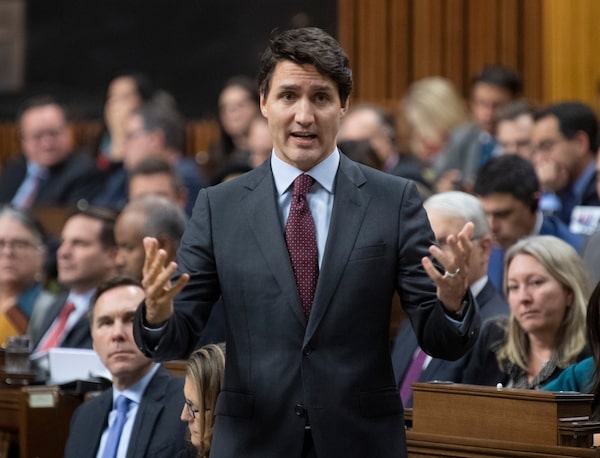
Prime Minister Justin Trudeau responds to a question during Question Period in the House of Commons, Dec. 9, 2019 in Ottawa.Adrian Wyld/The Canadian Press
An independent analysis of the last Parliament found MPs voted with their own party 99.6 per cent of the time and displayed unhealthy levels of partisanship, polarization and hostility.
In its latest report on parliamentary trends, the Samara Centre for Democracy spoke with MPs who sat in the House the Commons between 2015 and 2019. The centre also conducted a detailed analysis of voting trends, government tactics and the length of time MPs spent debating legislation.
It said the level of party loyalty in Canada is “extreme” when compared with the British Parliament, where MPs are “notably more rebellious.”
Looking at government tactics in the House of Commons, the report noted that the Liberal government continued a controversial practice of the previous, Conservative government: introducing large “omnibus” bills that can be hard for MPs to review properly.
The average size of a government bill grew 10 per cent under the Justin Trudeau Liberals – to 79 pages – while the longest was 884 pages. The previous government’s largest bill was 962 pages long.
Samara research director Michael Morden said the use of omnibus bills and strict party control could increase in a minority Parliament, where the government’s survival is uncertain.
“In a minority situation, the stakes feel like they’ve ramped up, and that can have a negative impact,” he said.
Mr. Morden said the culture of Parliament creates a disconnect between what MPs say they want – more free votes and genuine debate – and how they act.
“The pressure is so overwhelming when you’re in it,” he said. “I don’t think it has to be that way. But what we’re finding is it’s hard to break down such a baked-in culture.”
The report notes that the 99.6-per-cent finding may be somewhat inflated by occasions in which MPs voted repeatedly for hours on procedural motions.
Looking more closely at the data, Samara found a handful of MPs with an independent streak.
Liberal MP Nathaniel Erskine-Smith dissented from his party 37 times, or 3.4 per cent of the time, placing him at the top of Samara’s list of “rebels.”
Former Liberal MP Robert-Falcon Ouellette was second with 21 dissenting votes, followed by former Conservative MP Sylvie Boucher with 14 and Conservative MPs Michael Chong and Peter Kent, both with 13 dissenting votes.
The non-partisan research centre supplements its data research by surveying 20 to 30 per cent of the MPs in Parliament each year. The feedback is reported anonymously in an effort to encourage candour from the survey participants.
“A prevailing theme of the Samara Centre’s research with MPs is that unhealthy partisanship has pervaded Parliament,” the report states. “Unhealthy partisanship is a combination of polarization and hostility toward members of other parties, and protective and uncritical uniformity among members of the same party. Within the party, unhealthy partisanship turns caucuses, which are meant to deliberate and hold leaders to account, into instruments of the leader and their staff.”
The term “caucus” refers to a group of MPs of the same political party. Party caucuses normally meet behind closed doors every Wednesday in Ottawa when the House is sitting. They also meet in smaller groups, such as regional caucuses or caucuses focused on specific policy issues.
The centre’s reports generally urge MPs to be more independent and to use the parliamentary powers at their disposal to hold government officials to account and to review federal legislation and spending.
The House of Commons is scheduled to resume sitting Monday.
 Bill Curry
Bill Curry